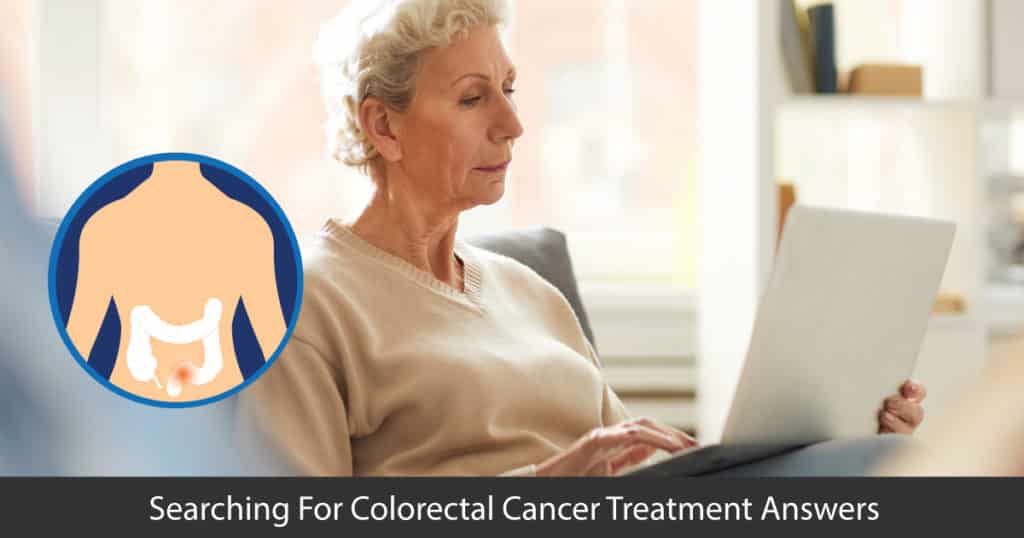Searching For Colorectal Cancer Treatment Answers

Inspire members discuss their colorectal cancer (CRC) treatment options and choices in the Fight Colorectal Cancer Support Group on Inspire because there is a lot to discuss. While it’s the third most common cancer in the United States,1 determining a course of treatment for an individual’s CRC is a multi-step process.2 A positive test is followed by other tests: biopsies, scans, blood tests, sigmoidoscopy, colonoscopy, or others.3 Surgery is the most common treatment; but treatments can include chemotherapy, radiation, radiofrequency ablation, and cryosurgery; some are determined by the genetics of the tumor itself.2
Alongside the emotional shock, posts in the Newly Diagnosed thread of this Inspire community show that patients and caregivers want help in navigating their treatment journey.
In “Can I get some help/answers,” an Inspire member writes,
I was just diagnosed with Stage 3 colon cancer. I had colon resection surgery a month ago and will be starting Chemo soon. My world was turned upside down when I got the diagnosis. I am having major anxiety… I will see my oncologist for the first time next week and I’m wondering what questions I should be asking. – Inspire Member
One reply suggested the member go to an outside resource and provided a link: “There is a patient section where you can download the Colon Cancer Treatment Guidelines for free.” A different reply outlined the crucial roles caregivers play in treatment:
My husband and daughter were there every step of the way – I had them ask all the questions, make the phone calls, etc., as my job was to get thru that surgery and the treatments with as little stress as possible. They handled all the details – that was my way though – someone else of course may want to handle it differently. You need to choose a doctor and hospital that you trust and that makes you feel well taken care of. – Inspire Member
Patients and caregivers who are further along in the journey have a different level of expertise, exemplified in their familiarity with medical terminology when discussing the complex self-care required during targeted treatment, long term treatment, and recurrences. They are often looking to “compare notes” with their peers to expand their knowledge about what is available. One member, whose spouse was diagnosed with Stage 2a CRC, writes:
Had the surgery to get [the tumor] out and now we are faced with several differing opinions on what he can do to prevent recurrence. Most of the docs say 6mo of [a treatment] while one … doc at [location] has said that… it would be [other treatment] he would offer. We are stuck. He is week 7 post surgery and we have to make a decision…I don’t know how to make sense of this so we can make the right choice for him. Help! — Inspire Member
There were 19 replies, some of which suggested getting more testing and second opinions. The original poster took action on the suggestions, and asked for more:
Thanks so much. We ordered the genetic testing a couple weeks ago so should have that soon… I just ordered for a second opinion of his pathology because I agree with you that we need to know more. — Inspire Member
The Inspire CRC community reflects the larger trend of consumers using social media to perform medical research. A 2017 study found that “Currently, more than 40% of the health care consumers utilize social media for their healthcare information needs,” 4 which aligns very closely with the percentage reflected in Inspire’s 4th Annual Membership survey,5 which found that 41% of patients surveyed have asked for or received advice related to health on social media, and 45% have supplied it.
As the quotes in this article show, patients and caregivers ask for advice when making treatment decisions, a finding that also bears out in our 4th Annual Membership survey: Of those using social media to investigate treatment options, 82% asked for advice and 75% of those who asked were influenced by the answers. In fact, advice sought for treatment options exceeded all other categories. (In comparison, only 37% sought advice on doctors, and 29% were looking for opinions on hospitals.)
The patient journey for colorectal cancer is complex at every stage. Fight Colorectal Cancer Support Community on Inspire has an audience of over 40,000 unique users searching for answers. Inspire CRC community members, patients and caregivers both, go online at all points in the journey. Yes, they are looking for encouragement and how to deal with side effects; but they are also looking for others facing treatment options similar to theirs, right down to people who have the specific genetic mutations they do. One member with CRC offered sage advice that applies to every disparate path on the colorectal cancer journey:
You will get through this. No question is stupid. Stay hydrated. If you are unclear about anything your oncologist says, ask questions.
People with CRC online are often looking for clarification and advice about treatment.
For more on the Fight Colorectal Cancer Support Community on Inspire see “Hacking clinical trials: Two awareness and protocol strategies invented by patients and caregivers that work”
Inspire offers a trusted community to patients and caregivers. Our goal with this blog, this website and our content is to provide the life science industry access to the true, authentic patient voice. In so doing, we support faithful operationalization of patient-centricity. Take a look at our case studies, eBooks and news outlet coverage.
References
1 https://www.cancer.org/cancer/colon-rectal-cancer/about/key-statistics.html
2 https://www.cancer.gov/types/colorectal/patient/colon-treatment-pdq
3https://fightcolorectalcancer.org/treatment/diagnosis/
4 https://www.ncbi.nlm.nih.gov/pmc/articles/PMC5708107/
5 https://corp.inspire.com/resource/fourth-annual-survey






